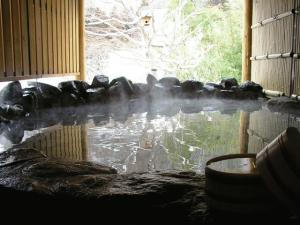Onsen
When it is getting colder, we feel like bathing in onsen, spas or hot springs, all the more. Many city dwellers also relax both physically and mentally in large bath tubs at neighboring sento or public baths, without visiting onsen.
Bathing in daily life is not always common throughout the world. When visiting abroad, many Japanese firstly miss hot-water baths rather than Japanese food.
In 2004, “Tsubo-yu,” a natural barrel-shaped tub in Kumano Kodo of Wakayama Prefecture, was registered as a UNESCO World Cultural Heritage site firstly as a public bath. Bathing as a Japanese culture since ancient times is recognized as a World Heritage.
Why do Japanese love bathing? Some say that Japanese love bathing because we are fond of cleanliness. But, taking showers is more effective when we only wash our bodies. I think Japanese can find special meaning in bathing. Probably, Japanese like bathing and therefore we like cleanliness as a result: I think this makes a lot of sense.
It is said that the relationship between Japanese and onsen can be traced back to 6000 years ago, the Jomon Era. As descriptions about onsen are found in “Kojiki” and “Nihon Shoki,” the oldest books in Japan, the relationship seems to be quite long and old.
In ancient Shinto, ritual purifications such as misogi (禊) or mizugori (水垢離) were conducted. Gyozui, bathing in small tubs in summer, was derived from these rituals. On the other hand, it is said that the effectiveness of onsen and the custom of bathing which soothes the mind and the body were disseminated through Buddhism.
Bathing in Shinto is stoic, but bathing in Buddhism is amiable. In the 8th century, Buddhist sutras spread, and according to them, people began to believe that “we can earn merit and die peacefully by bathing.” Then, it is said that Japanese say “gokuraku, gokuraku” when bathing, as gokuraku in Buddhism means heaven or paradise, and bathing is so relaxing and comfortable as if we were in gokuraku. Among famous and popular onsen, there are many associated with Buddhist saints who travelled throughout Japan in order to be engaged in missionary work.
Worshiping of nature in Japan is based upon thankfulness to multitudinous gods and for blessings of all nature, and we therefore contact nature with reverence. What is common between misogi and onsen is that both are holy acts to directly feel the immense powers of nature and enjoy its blessings.
Onsen is a blessing of nature brought by rich water and inexhaustible “geothermal heat” energy which is special to the world's pre-eminent volcanic countries. We tend to be less conscious of the reasons why we love bathing, but, the DNA of our ancestors, who have harmoniously lived with nature, might have been passed down from generation to generation.
(Kenji Suzuki)











